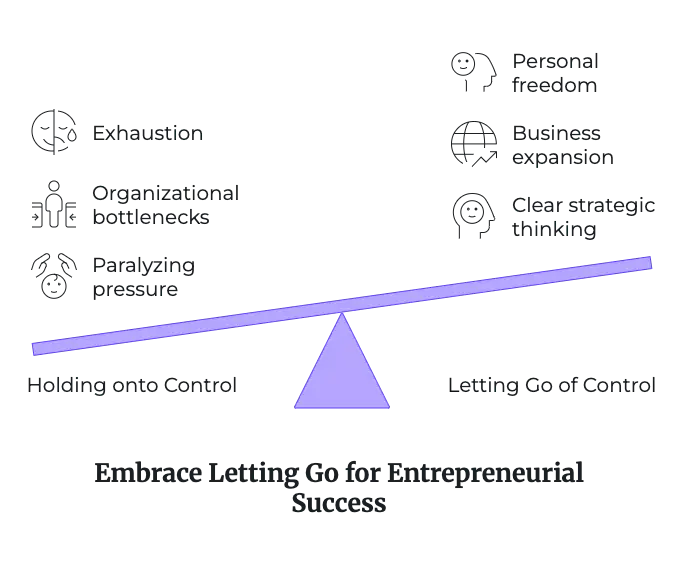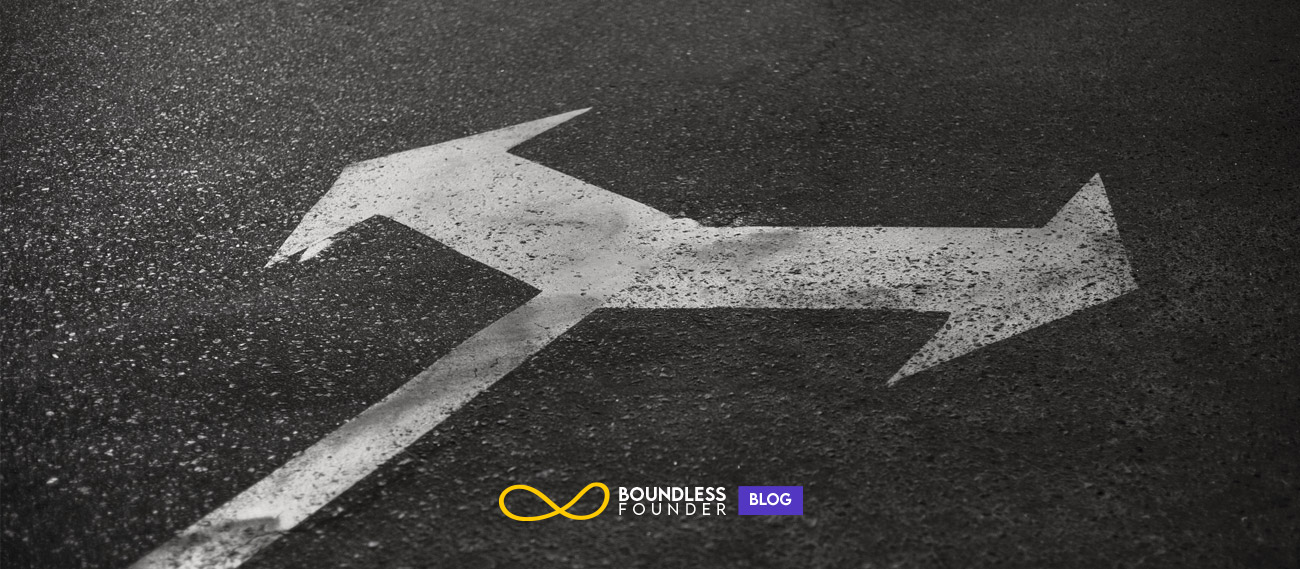“The entrepreneur’s greatest freedom comes from accepting what cannot be controlled.”
Entrepreneurs are taught to take charge, make things happen, and forge their path. The very essence of entrepreneurship seems rooted in control—controlling our destiny, our business outcomes, and our future success. But what if I told you that this obsession with power is actually holding you back?
In my entrepreneurial journey, I’ve learned a hard truth: the more desperately I tried to control every aspect of my business, the more overwhelmed and ineffective I became. It wasn’t until I faced a potential business shutdown that I discovered a paradoxical truth—true Entrepreneurial Freedom doesn’t come from controlling everything, but from knowing what to let go of. By accepting the limits of my control, I found greater freedom, resilience, and effectiveness.
The Spiritual Bedrock of Entrepreneurship
In Chapter 6 of “The Inside-Out Entrepreneur,” I explored the concept of spiritual bedrock—the foundation that supports and sustains you through the entrepreneurial roller coaster. This spiritual foundation isn’t about religious belief but connecting with something larger than yourself and your immediate business concerns.
Spiritual entrepreneurship integrates self-development, co-creation, and a mindset that blends personal growth with business impact. As the Bridging Hearts Foundation describes it, it emphasizes “knowing, choosing, creating, and giving yourself as a cyclical process for spiritual and entrepreneurial growth.”
When I faced the imminent collapse of my second acquisition attempt, with VCs suggesting we shut down operations, something within me refused to accept that as the final word. This wasn’t blind optimism but a connection to something deeper—a sense that regardless of the outcome, I would be okay. This spiritual bedrock gave me the courage to make one last attempt, sending a bold email to the acquiring company’s CEO that ultimately salvaged the deal.
The Paradox of Control: Less Is More
The entrepreneurial journey is fraught with paradoxes, but perhaps none is more powerful than this: letting go of the need to control everything paradoxically increases your effectiveness.
Research from business psychology indicates that higher self-acceptance accelerates growth and reduces stress, making entrepreneurs more effective decision-makers. According to The Boutique Coo, “Accepting yourself, flaws and all, reduces anxiety and perfectionism, improves delegation, and boosts resilience—directly impacting business growth.”
I experienced this firsthand during my startup’s darkest hour. When I finally accepted that I couldn’t control the outcome of our acquisition negotiations, I found the freedom to make a bold move without fear. The internal dialogue shifted from “I must make this work” to “I’ll do my best and accept whatever comes.” This mental shift removed the paralyzing pressure and allowed me to think clearly and strategically.
As noted by Exceptional Skills, relinquishing some control is necessary for business expansion and personal freedom. When we grip too tightly, we become bottlenecks in our organizations, preventing growth and exhausting ourselves.

Entrepreneurial Strengths That Become Weaknesses
Many qualities that make us effective entrepreneurs can become liabilities when taken to extremes. According to research from Harvard Business School, successful entrepreneurs typically possess adaptability, resilience, creativity, risk tolerance, and self-awareness.
However, Forbes Council notes that these entrepreneurial strengths can transform into weaknesses as a business grows. For instance, the self-reliance that helped you launch can become micromanagement that stifles team growth. The decisiveness that got you started can turn into impulsivity that creates chaos as your organization scales.
In my journey, I found that my strength in execution and problem-solving became a weakness when I couldn’t delegate effectively. I believed no one could handle certain tasks as well as I could—a classic control illusion that nearly drove me to burnout.
The solution wasn’t to abandon these strengths but to balance them with acceptance of my limitations and trust in others. By acknowledging that perfect control is impossible, I could focus my energy where it truly mattered.
Mental Resilience Exercises for Entrepreneurs
Building the mental resilience to accept what we cannot control takes practice. According to the Entrepreneur’s Organization, 88% of entrepreneurs struggle with mental health, making resilience-building crucial for long-term success.
The MMC Framework offers a practical approach:
- Movement: Physical activity to clear your mind and reduce stress
- Mindset: Cultivating positive self-talk and gratitude
- Connection: Nurturing relationships that provide support and perspective
When I felt overwhelmed by the uncontrollable aspects of my business, I found that a simple walk outside would reset my perspective. Physical movement created mental space, allowing me to distinguish between what I could and couldn’t control.
Another powerful exercise is the “Inner Game Mastery” approach, which focuses on:
- Silencing self-criticism
- Accepting limited control
- Improving concentration on what truly matters
These practices don’t just make you feel better—they make you more effective by directing your energy where it can have the most significant impact.
Frameworks for Focusing on What You Can Control
One of the most practical tools I’ve encountered is the Circle of Control framework, inspired by Stephen Covey and detailed by Leading Sapiens. This approach divides your concerns into three categories:
- Circle of Control: Things you have direct control over (your actions, responses, priorities)
- Circle of Influence: Things you can influence but not directly control (team performance, customer perceptions)
Circle of Concern: Things that affect you but you cannot control (market conditions, competitor actions)

The key is to focus your energy on the inner circle—what you can directly control—while maintaining awareness of but not obsessing over the outer circles.
Learning Loop recommends a practical exercise: draw these three circles and map your current concerns within them. This visual representation helps prioritize your actions and minimize stress over uncontrollable factors.
TrustCloud’s community suggests developing customized control frameworks for more business-specific applications that identify critical processes, assess risks, and tailor controls to your unique business context. This ensures you focus on areas that truly drive results and mitigate risk.
Finding Freedom Through Acceptance
Acceptance doesn’t mean resignation or giving up. Instead, it means acknowledging reality as it is, including the limits of your control, and working effectively within those boundaries.
When I finally accepted that I couldn’t control the outcome of our acquisition, I stopped wasting energy on anxiety. I focused entirely on making my best move—that crucial email to the CEO. The freedom from this acceptance allowed me to act boldly without the paralyzing fear of failure.
This is the greatest irony of entrepreneurship: by accepting that we control far less than we think, we gain the freedom to focus our energy where it truly matters. We stop exhausting ourselves, fighting against reality, and start working with it.
Practical Steps to Start Practicing Acceptance Today
- Identify your circles: Take 15 minutes to draw your circles of control, influence, and concern. Be honest about what truly belongs in each.
- Practice daily reflection: Ask yourself, “What am I trying to control that I simply cannot?” Release these concerns through journaling or meditation.
- Focus on your response: When facing challenges, shift your focus from “How can I control this situation?” to “How can I respond most effectively?”
- Build your support system: Surround yourself with people who can provide perspective when you’re caught in control patterns.
- Embrace uncertainty: Make peace with not knowing all outcomes. Consider uncertainty an opportunity rather than a threat.
Remember, entrepreneurship isn’t about controlling everything—it’s about navigating uncertainty with grace and resilience. By accepting the limits of your control, you’ll find greater freedom, effectiveness, and perhaps most importantly, peace along your entrepreneurial journey.
Final Thoughts
The control illusion is just that—an illusion. True entrepreneurial freedom comes not from attempting to control everything but from the wisdom to discern what you can and cannot control and the courage to act accordingly.
You can transform this understanding into a competitive advantage by building your spiritual bedrock, understanding the paradox of control, strengthening your mental resilience, and applying practical frameworks. With or without your constant intervention, you’ll make better decisions, build stronger teams, and create a thriving business.
As I learned through my entrepreneurial journey, when you finally release the illusion of control, you don’t lose power—you gain it. You direct your energy where it matters most, unlocking your full potential as an entrepreneur.
Are you ready to find freedom through acceptance?
Join the Boundless Founder community to connect with other entrepreneurs on this journey of growth and resilience. Visit www.BoundlessFounder.co/join to learn more.











Responses